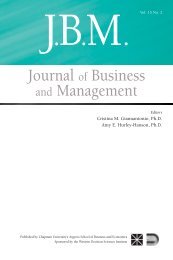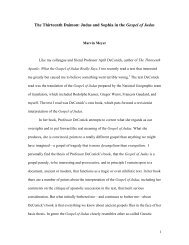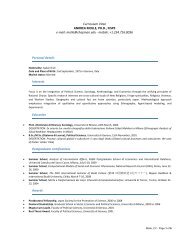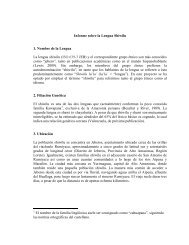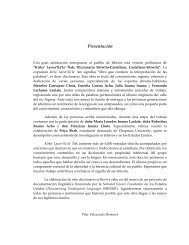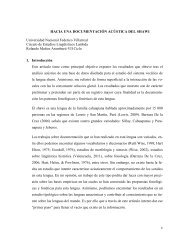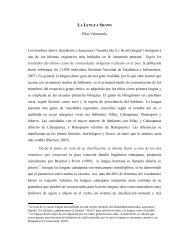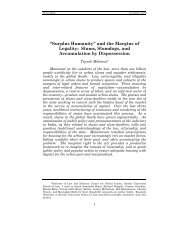Chapman Law Review - Chapman University
Chapman Law Review - Chapman University
Chapman Law Review - Chapman University
You also want an ePaper? Increase the reach of your titles
YUMPU automatically turns print PDFs into web optimized ePapers that Google loves.
Do Not Delete 12/7/2011 2:17 PM<br />
34 <strong>Chapman</strong> <strong>Law</strong> <strong>Review</strong> [Vol. 15:1<br />
unlikely because the Bureau or any court interpreting the Act<br />
will have to look to the Act‘s definition of credit, not any<br />
individual state‘s definition of credit. The Act sets out a<br />
definition of credit. 58 It does not defer to states‘ definitions of<br />
credit, so courts will have to analyze transactions in light of the<br />
Act‘s definition regardless of state law. In similar contexts,<br />
courts look only to the federal statute‘s definition of a term to<br />
determine its meaning. For example, in determining whether<br />
rent-to-own transactions are credit within the meaning of the<br />
Truth in Lending Act, courts do not consider state law but<br />
instead just evaluate the definition of credit in the Truth in<br />
Lending Act statute. 59<br />
Looking instead to the Act itself, it seems unlikely rent-toown<br />
is credit. Credit means (1) ―the right granted by a person to<br />
a consumer to defer payment of a debt, incur debt and defer its<br />
payment‖ or (2) ―the right granted by a person to . . . purchase<br />
property or services and defer payment for such purchase.‖ 60<br />
Rent-to-own agreements fall outside both of these parts of the<br />
definition. The statute does not define debt, but debt is<br />
commonly defined as an obligation to pay money arising out of a<br />
transaction. 61 Rent-to-own-agreements do not involve taking on<br />
debt because the rental agreements obligate consumers to pay for<br />
rental periods at the start of the rental period, not the end, so the<br />
consumer generally does not owe money because of the<br />
agreement. 62<br />
Additionally, rent-to-own agreements do not involve<br />
deferring payment for a purchase. Like debt, the statute does<br />
not define purchase, but in most cases purchase involves a<br />
transfer of an interest in property for money. 63 Because<br />
58 Dodd-Frank § 1002(7).<br />
59 See Ortiz v. Rental Mgmt., Inc., 65 F.3d 335, 341 (3d Cir. 1995) (determining rentto-own<br />
is not ―credit‖ based on the definition in the statute and the Regulations<br />
promulgated to implement it and the federal commentary on the statute); Starks v. Rent-<br />
A-Center, No. 3-89-0786, 1990 U.S. Dist. LEXIS 20099 (D. Minn. May 16,<br />
1990) (concluding that rent-to-own contracts are not extensions of credit under TILA even<br />
though the court found that rent-to-own contracts were credit sales under Minnesota<br />
law); In re Crawford, No. 90-50066, 1992 Bankr. LEXIS 2515 (E.D. Bankr. Ky. 1992)<br />
(assessing whether rent-to-own was a credit sale under TILA completely separately from<br />
assessing rent-to-own‘s status under Kentucky law).<br />
60 Dodd-Frank § 1002(7).<br />
61 See, e.g., 15 U.S.C. § 1692a(5) (2006) (reporting the Fair Debt Collection Practices<br />
Act‘s definition of debt).<br />
62 Even cases finding that rent-to-own agreements are credit sales state that rent-toown<br />
does not entail accumulating debt. See Miller, 518 N.W.2d at 549.<br />
63 See, e.g., 16 U.S.C. § 3372(c)(2) (2006) (―It is deemed to be a purchase of fish or<br />
wildlife in violation of this Act for a person to obtain for money or other<br />
consideration . . . (A) guiding, outfitting, or other services; or (B) a hunting or fishing<br />
license or permit . . . .‖); U.C.C. § 1-201(29) (2007) (―‗Purchase‘ means taking by sale,<br />
lease, discount, negotiation, mortgage, pledge, lien, security interest, issue or reissue, gift,



